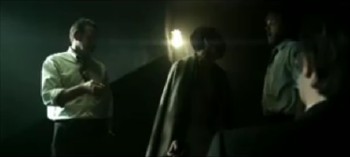“Were the police really this corrupt?”
Wed. March 4, 2009Categories: Abstract Dynamics

Me on the Birtish* TV event of the decade, C4’s outstanding Red Riding trilogy… UK readers, make sure you tune into this tomorrow night… and keep faith with it if you have doubts about 1974 … the three films together are greater than the sum of the parts, and 1974 is the weakest film, just as it is the weakest of the novels… I love the fact that it has already produced a few tiny cracks in capitalist realist good sense, prompting the Radio Times (see below) to ask, “were the police really this corrupt”? Even this question, even the raising of the possibility that there might be a brutal Real beyond the PR-slick Dixon Of Dock Green cops on Crimewatch, shows how the media can still be a contested zone. Astonishingly, it seems that – even at this late stage, after all C4’s betrayals and compromises, after the BBC’s capitulations and evasion – it is still possible for British television to do more than circulate images of/ for the dominant ideology.
There’s more material for a discussion of the differences between the state and the public here. The Red Riding films have been produced as part of C4’s public service remit, indeed they might be a belated attempt to fulfill it – as Nick James notes in his editorial in the March issue of Sight & Sound, the fact that C4 will soon be called upon to justify its funding was no doubt part of the motivation for its making such a challenging sequence of dramas at this time. Nevertheless, here is a situation in which the public sphere and the machinery of the state, far from being the same thing, are in a relationship of antagonism. Under capitalist realism, it’s routine for public service to be equated with support of consensual reality and its protectors. Yet with Red Riding, it’s as if C4 are doing the equivalent with TV drama of what Dominic Fox (semi)jokingly asked for when he suggested that the BBC should “expand the remit of Crimewatch to include police corruption and brutality”. It is precisely the exorbitance of Peace’s vision of corruption, its complete lack of even-handedness, its inversion of the bad apple model (it is the good coppers who are the exception in Peace’s world, and even they are tainted), that is so valuable now in this time of massive reaction and restoration.
*Bat draws my attention to this Freudian slip of a typo